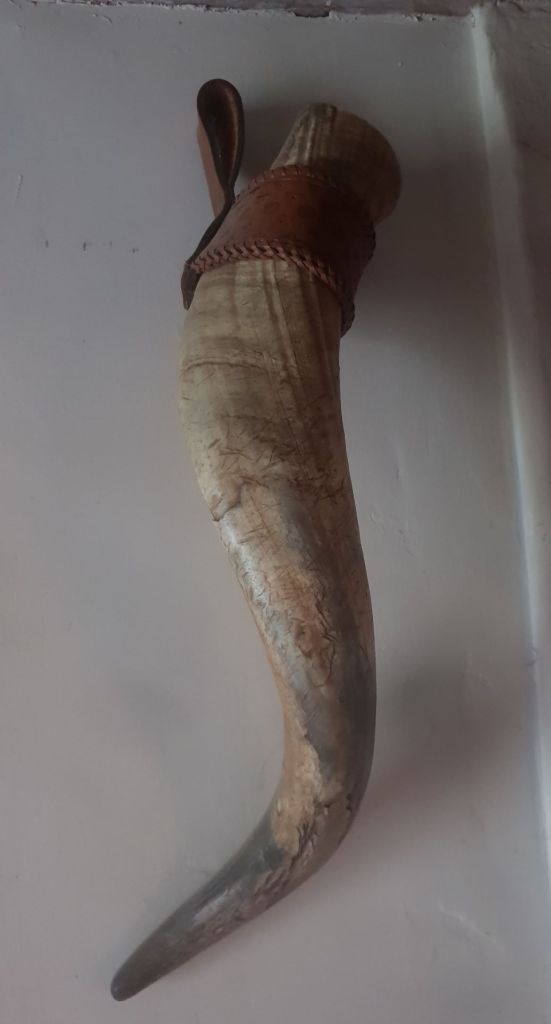The 13 Treasures of Britain
(Reprinted from theelvenscroll – originally from May 2020)
The Thirteen Treasures of the Island of Britain are a very interesting set of magical items written down in late medieval Welsh literature. Interesting, in that only one is a weapon, whilst the others have a diverse range of abilities, most of which, would come in very handy for use (or misuse) during this Covid-19 lockdown.
There are several dedicated to food, all very handy when the local supermarket has a queue a mile long to get in, or when someone has cleaned them out of tinned beans:
- The Hamper of Gwyddno Garanhir (if food was put in it for one man, it would increase a hundredfold),
- The Horn of Bran Galed (whatever drink that might be wished for, would be found in it),
- The Knife of Llawfrodedd the Horseman (which would serve for twenty-four men at the table),
- and the Crock and the Dish of Rhygenydd the Cleric (whatever food might be wished for, would be found in it).

Obviously, these point to a time when a poor or mediocre harvest would have far ranging effects on the populace, and the items gave the bearers at the time (5th – 8th centuries) immense power or reputation.
Bored in lockdown?
- Fancy a game of chess but don’t know how to play? Why not use The Chessboard of Gwenddoleu ap Ceidio – its silver pieces play against themselves.
- Already completed your exercise for the day but you still want to go out? Why not use The Mantle of Arthur, an invisibility cloak?
- What’s that? You would like to visit the beach? Just jump in The Chariot of Morgan Mwynfarr for a quick transportation to wherever you wish for.
- The Halter of Clydno Eiddyn would appeal to many of my horsey friends. Stapled to the end of his bed, he would wish for a horse and would wake to find the horse within the halter.
These treasure all appeal as power items, horses and chariots were for the rich and noble only, whilst an invisibility cloak could insinuate the wearers ability to be anywhere and everywhere without being noticed. The last four treasures (the Crock and the Dish above count as two!) are specific to the divination of a person’s standing, worthiness and bravery. Without social media followers to count, the ancient Celts and Britons had to have another way to distinguish the worthiness of their people. Hence these last four treasures.
- The Sword of Rhydderch the Generous. Called White-Hilt or Dyrnwyn, it would burst into flame if a well-born man drew it. Rhydderch was very generous (hence his name) and would offer the sword to any man who asked for it, but on being told its power, they would all reject it.
- The Whetstone of Tudwal Tudglyd. If a brave man sharpened his sword on it and then drew blood, his victim would certainly die, if a cowardly man sharpened his sword, then the blade would never draw blood.
- The Coat of Padarn Redcoat. Relieved to find out that this had nothing to do with Butlins. If a well-born man put it on, it would fit correctly, but if a churl or low-man tried it, it would not fit at all.
- Lastly, The Cauldron of Dyrnwch could distinguish between the brave and the cowardly by whether meat placed in it to boil, did so fast or not at all.
To deal with this lockdown in the modern age, we have the new Treasures, The Internet; the oracle of everything factual and non-factual, important or unimportant ever created. It also allows us to talk to friends and family on the other side of the world. Netflix et al, a theatre in our own abode that allows you to watch almost anything. Next day delivery services, anything delivered to your door (well, maybe behind your wheelie bin instead) from anywhere – almost as fast as The Chariot of Morgan Mwynfarr!
What would Arthur, Rhydderch and the others have made of these?